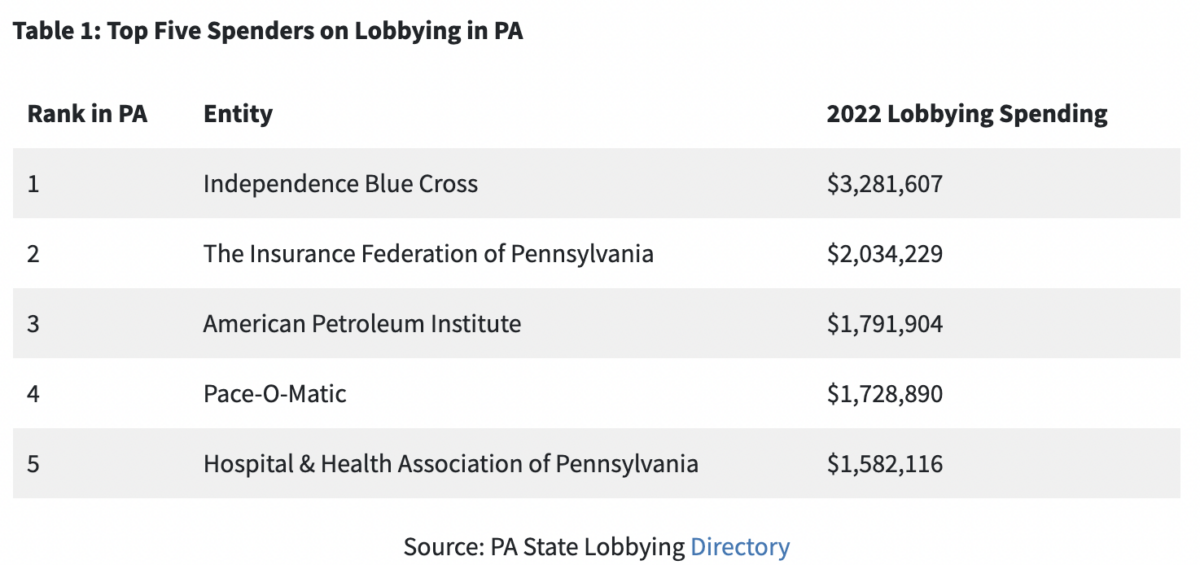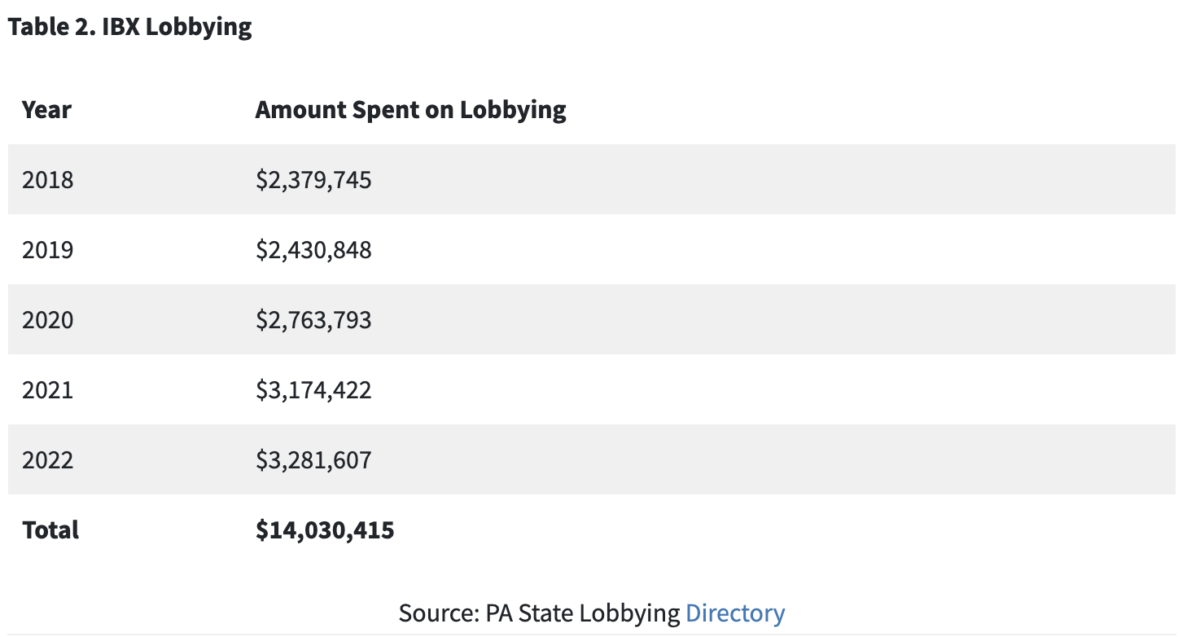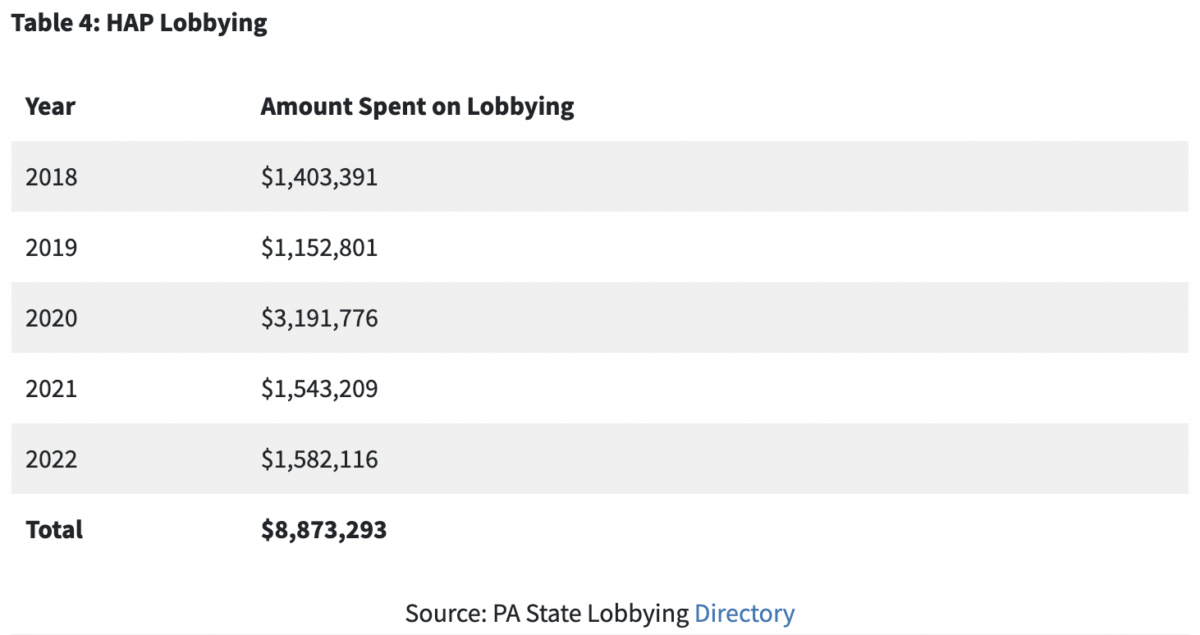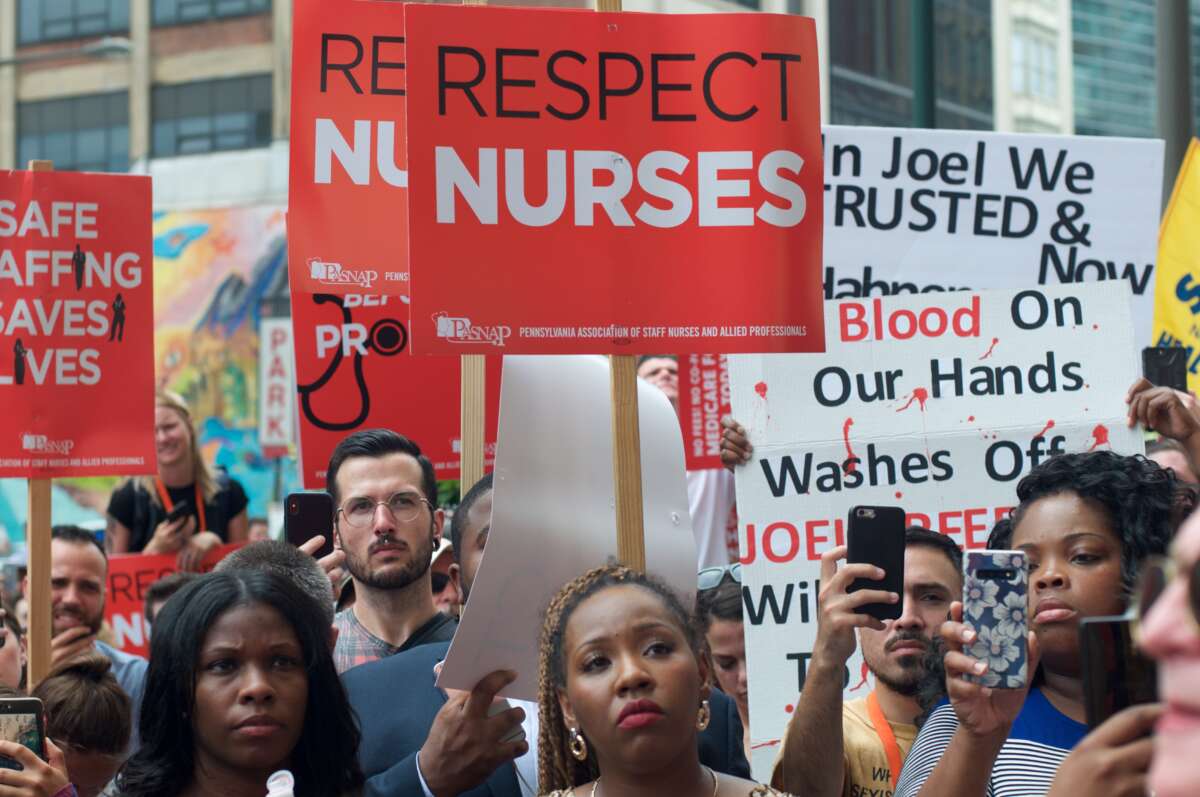Did you know that Truthout is a nonprofit and independently funded by readers like you? If you value what we do, please support our work with a donation.
In Pennsylvania, healthcare profiteers top the list of the most aggressive spenders on lobbying in the state. Corporations in the United States spend hundreds of millions of dollars every year on well connected lobbyists to influence legislation both on a federal level and in states and cities. Pennsylvania is one of the many states in the US with relatively loose regulations on lobbying and gifts to legislators. For example, lawmakers can accept gifts worth any amount, even cash, from lobbyists as long as they disclose those gifts. These loose lobbying regulations, combined with the unlimited spending on campaign contributions, make it easy for corporations to exert their influence over elected officials in the capital city of Harrisburg.
Healthcare has been the number one top sector in lobbying spending in Pennsylvania for at least the past 10 years. According to the PA Department of State, the margin spent over other sectors has only gotten larger. In 2022, nearly $30 million was spent on direct healthcare lobbying, about $11 million was spent on Medicare and Medicaid, and over $13 million was spent on insurance lobbying. Together, that’s more than the total lobbying spending on energy, the state budget, and education combined. In fact, in 2022, healthcare related entities represented three out of the top five top spenders on lobbying in the state.

This spending is driven by large healthcare insurers and hospital systems, many of which have Medicaid contracts in Pennsylvania that are worth billions of dollars. These large corporations and their trade associations use their power to lobby against adequate nurse-to-patient ratios, against policies that hold hospitals responsible for medical malpractice, and lobby against legislation that would require that state Medicaid contractors cooperate in good faith with labor unions.
To preserve the status quo and the large revenue stream from Medicare and Medicaid, these companies spend millions on lobbying legislators themselves and also work together through industry trade groups like the Insurance Federation of Pennsylvania and the Hospital and HealthSystem Association of Pennsylvania.
The Biggest Spenders
Large hospital systems and health insurers have immense power in communities and states not only because of their role in providing critical care, but also because they are typically among the largest employers in their region. The members of the Hospital and Healthsystem Association of Pennsylvania (HAP) employ nearly 600,000 people across the state, or about one in 10 jobs statewide. Not only do workers in Pennsylvania depend on the industry for their livelihoods, but the millions of people insured by these companies depend on them to help cover the high cost of healthcare. Yet, these institutions are making billions of dollars in profits for executives and shareholders while squeezing ever increasing premiums out of their customers and refusing to pay many of their workers living wages.
Large health insurers like UnitedHealth, Aetna, UPMC, Independence Blue Cross, and Geisinger spend hundreds of thousands of dollars on lobbying and campaign contributions in the state capitol. In 2022, UPMC spent over $740,000 on lobbying while Geisinger spent over $950,000. Spending even more than both of these healthcare giants was Philadelphia-based Independence Blue Cross.
Independence Blue Cross — $3,281,607 Spent on Lobbying in 2022
Independence Blue Cross (IBX) is a health insurer based in Philadelphia, Pennsylvania, that serves over seven million people and brought in almost $27.4 billion in revenue in 2022. The corporation has been steadily increasing its spending on state lobbying and hit a five year high in 2022, spending over $3.2 million. IBX spends more than any other entity on lobbying in the state of Pennsylvania. While corporations are not required to disclose what bills their lobbyists work on, Independence Blue Cross’s latest quarterly lobbying report states that it lobbied on issues related to Healthcare, Insurance, Managed Care, and Medicare/Medicaid.

Independence Blue Cross’s subsidiary, Keystone First, is the largest Medicaid managed care provider in the state, serving over 400,000 people in Southeast Pennsylvania. IBX also offers Medicare Advantage plans, or privatized Medicare, for Pennsylvania’s seniors. With billions of dollars flowing in from government programs, it’s critical that Independence Blue Cross stay in the good graces of legislators both in the federal and state government. IBX spent over $1.4 million on federal lobbying in 2022. According to Lobbying Disclosure Act reports filed in 2022, the corporation spent most of its resources lobbying on Medicare Advantage, a privatized Medicare program.
In 2020, Independence Blue Cross subsidiaries agreed to pay over $2.25 million after allegations that the corporations inflated the costs of their Medicare Advantage programs in their bid to the Centers for Medicare and Medicaid Services. An audit in 2023 also found that IBX received over a half million dollars in overpayments through the Medicare Advantage program. IBX President and CEO Gregory E. Deavens sits on the board of America’s Health Insurance Plans, a group that has been lobbying the federal government to avoid cracking down on these types of Medicare Advantage overpayments. In other words, IBX is advocating for the government to allow insurers to commit fraud in Medicare Advantage payments.
While these programs are federal, states have the power to regulate and administer them in ways that can either benefit the corporation’s bottom line or not. To ensure the former, IBX hires some of the most well connected lobbyists in the state and its executives and former executives are among the most powerful influencers in the state.
The corporation currently has access to 39 registered lobbyists through 10 retained lobbying firms in Pennsylvania. Some higher profile lobbyists include Anthony Costa, son of Senate Minority Leader Jay Costa; Todd Nyquist, former Chief of Staff for former State Senate President Corman; and Megan Crompton, wife of former Republican Commonwealth Court Judge (recently turned lobbyist) Andrew Crompton. Former Governor Tom Ridge, now owner of the Ridge Policy Group, also now lobbies for Independence Blue Cross. IBX President and CEO, Deavans, also served on the transition leadership team for current Pennsylvania Governor, Josh Shapiro.
The Insurance Federation of Pennsylvania — $2,034,229 Spent on Lobbying in 2022
The Insurance Federation of Pennsylvania is a trade group for large insurance companies in Pennsylvania. Its members include large health insurers like UPMC, Aetna, Cigna, and UnitedHealth and large personal or auto insurers like Erie Insurance, Nationwide, Liberty Mutual, Metlife, and Chubb. Members pay dues that help pay for the millions in lobbying expenses. For example, Cigna and UnitedHealth Group reported spending more than $50,000 each in dues to the Federation in 2022.
The Federation is led by Board Chair Brian Bolash, of Erie Insurance, and President Jonathan Greer, former Director of Policy for Governor Ridge. It spends about $2 million per year lobbying in Harrisburg, with the most recent quarterly report showing that it spent over $125,000 on gifts, food, lodging, and transportation for government officials in just three months.
The Insurance Federation doesn’t use outside lobbying firms but relies on the political ties of its own staff to influence the state legislature. In addition to the group’s President having previously held positions in the Governor’s Office and the State Senate, the group’s Director of Government Affairs, Noah Karn, has deep ties to the Pennsylvania state legislature. Karn served as the Executive Director of the State House Labor and Industry Committee, Policy Analyst for former House Speaker Mike Turzai, and was the Chief of Staff to Republican State Senator Mike Regan.

These lobbyists for the Insurance Federation work on issues that would impact the profits of the insurance giants listed above. For example, the Federation opposed a state mandate that would have ensured telehealth be covered by insurance during the Covid-19 pandemic. The Federation also opposed a bill that would have created a Family and Medical Leave Insurance Program to provide financial assistance to workers on family or medical leave during the pandemic. While thousands of Pennsylvanians were falling ill to Covid-19 and potentially losing income while on leave, the large health insurers behind the Federation were blocking legislation that could have helped ease that financial strain. At the same time, in 2021, Insurance Federation members like UPMC brought in a record $23.1 billion in revenue, Aetna brought in over $7.9 billion in profits, and UnitedHealth Group made over $17.7 billion in profits.
Hospital and Healthsystem Association of PA — $1,582,116 Spent on Lobbying in 2022
The Hospital and Health Association of Pennsylvania (HAP) is a trade association made up of 235 large hospital systems in Pennsylvania. The group spends millions on lobbying efforts every year in Harrisburg and also spends around $300,000 on federal lobbying every year. Most of the nearly $1.6 million that the Association spent on state lobbying was spent on direct lobbying of legislators or advertising materials, but the group also spends thousands of dollars on dinners, lodging, transportation, and/or gifts to legislators and their families. Since 2021, HAP has spent $15,337 on gifts and dinners for legislators according to the state lobbying database.
Major hospital systems on the group’s board of directors include UPMC, Highmark, Geisinger, Lehigh Valley Health Network, UPenn Health System, and the Children’s Hospital of Philadelphia. Together these health systems and hospitals brought in over $500 million in revenue that exceeded their expenditures last year, despite many being nonprofit organizations. Much of the wealth created by these so-called nonprofits goes to top executives and board members. For example, at UPMC, board members and the highest paid employees at the organization were paid a total of $184.9 million in 2022. In 2021, Highmark Health paid its board and executives nearly $40 million and spent over $10 million on high end business consultants like Deloitte. The Children’s Hospital of Philadelphia gave its board members and executives about $33 million in 2022.
The group’s PAC spent over $400,000 in the 2022 election cycle in Pennsylvania alone. Highmark was by far the top contributor to the PAC, giving over $60,000 from its corporate PAC in one year. The Hospital and Health Association’s PAC, or HAPAC, gave mostly to Republican House and Senate Campaign Committees and Republican leadership, with the exception of $10,000 to Governor Josh Shapiro and a $5,000 gift to fund Shapiro’s transition team. Further, Heather Tyler, Vice President of State Legislative Advocacy at HAP, served on Governor Shapiro’s transition team.

The group’s PAC spent over $400,000 in the 2022 election cycle in Pennsylvania alone. Highmark was by far the top contributor to the PAC, giving over $60,000 from its corporate PAC in one year. The Hospital and Health Association’s PAC, or HAPAC, gave mostly to Republican House and Senate Campaign Committees and Republican leadership, with the exception of $10,000 to Governor Josh Shapiro and a $5,000 gift to fund Shapiro’s transition team. Further, Heather Tyler, Vice President of State Legislative Advocacy at HAP, served on Governor Shapiro’s transition team.
According to the HAP’s website, the group lobbies for the deregulation of the industry and to limit the liability of hospitals in malpractice cases. In fact, the Association is a part of the Coalition for Civil Justice Reform along with the PA Medical Society, the Pennsylvania Health Care Association, and the right wing group, the Pennsylvania Manufacturers Society (which has significant ties to right wing billionaire Jeffrey Yass). The Coalition collectively spent hundreds of thousands of dollars during the Covid-19 pandemic, in part to ensure that corporations in the state could not be sued if customers or employees were to contract Covid-19 from their business.
The Hospital and Healthsystem Association is represented by high profile lobbyists including former Commonwealth Court Judge, Drew Crompton, and founder of the BRAVO Group. Chris Bravacos. Bravacos worked in the Governor Ridge administration as well as for the Republican Party of Pennsylvania, and is the Chair of Excellent Schools PA PAC (funded largely by billionaire right wing donor, Jeffrey Yass).
The immense and often unchecked power of the healthcare industry unfortunately leads to thousands of non-union, low wage jobs, increasing medical debt for Pennsylvanians, and skyrocketing medical costs that keep people from seeking the care they need. A study out of Kaiser Health found that over one million people in Pennsylvania have medical debt. While legislation has been introduced in the Pennsylvania State House to forgive medical debt, it’s clear that the healthcare industry’s army of lobbyists is prepared to protect its bottom line. When faced with invitations to dinners from these lobbyists or campaign donations from these companies’ PACs, legislators must decide, then, if they stand with large hospitals and giant insurers or their constituents that need quality and affordable care.
Press freedom is under attack
As Trump cracks down on political speech, independent media is increasingly necessary.
Truthout produces reporting you won’t see in the mainstream: journalism from the frontlines of global conflict, interviews with grassroots movement leaders, high-quality legal analysis and more.
Our work is possible thanks to reader support. Help Truthout catalyze change and social justice — make a tax-deductible monthly or one-time donation today.
